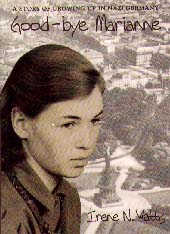|
________________
CM . . . .
Volume V Number 5 . . . . October 30, 1998
Good-bye Marianne is a very quiet book. It does not shout the
inequities of pre-war Germany, but it makes the reader aware of
them by that very quality of underemphasis. Marianne is an 11-year-old girl who likes school, hates math, has friends, plays
games, skips rope, just like other girls her age, but she is a
Jew, and this is Germany in 1938. The story opens with her
arriving at school to find the doors locked against her and the
notice, "As of today, Jewish students are prohibited from
attending German schools" stuck to the door. Her father has
already "gone underground," moving from place to place to avoid
being arrested; she and her mother make the best of things even
as everything deteriorates around them, with their one hope being
an exit permit for the whole family.
This dream does not come true. In the end, Marianne's mother is
able to get Marianne a place on the first of the
Kinderstransport - a relief effort aimed at getting children out
of Germany. In all, this organization rescued over 10,000
children, saving them from almost certain death at the expense of
removing them from country, friends and family. Marianne's close
relationship with her mother, contrasted with the atrocities she
sees daily in the city, helps the reader to understand just how
traumatic the times were and how desperate were the measures that
had to be taken. Readers rejoice with Marianne as she disembarks
in England - but do not learn what happens to her parents.
For those who think that the war was a time for heroics and
wonderful opportunities for bravery, this book points out the
reasons why it had to happen and the drab dreadfulness it brought
with it for most people. The spark of hope that is a common
ingredient of children's literature is found not only in
Marianne's escape from Berlin but also in a card she is given by
a friend as she is about to leave the country. The donor was a
true Aryan German, a member of the Hitler Youth, but when
confronted with the realization that Marianne is Jewish, he
managed to affirm friendship and say "We are not all the same!"
Thusly, the seeds of post-war reconciliation are planted even
before the actual fighting began.
Recommended.
Mary Thomas has worked for seven years in various elementary
school libraries in Winnipeg and is now on leave of absence with
her husband in Oxford for a year.
To comment on this title or this review, send mail to cm@umanitoba.ca.
Copyright © the Manitoba Library Association.
Reproduction for personal use is permitted only if this copyright notice
is maintained. Any other reproduction is prohibited without
permission.
Published by
TABLE OF CONTENTS FOR THIS ISSUE - OCTOBER 30, 1998.
AUTHORS |
TITLES |
MEDIA REVIEWS |
PROFILES |
BACK ISSUES |
SEARCH |
CMARCHIVE |
HOME
|

